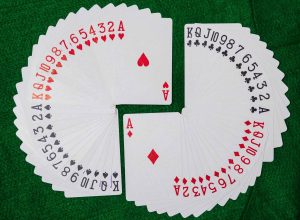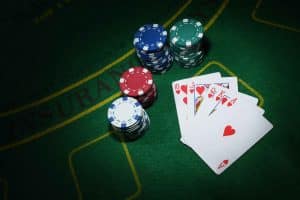Poker is a relatively easy game to learn. Learning the fundamentals of poker and determining which of the few hands is the best takes only a few minutes. That was the simple part. It can take a lifetime to truly master your game and turn poker into a consistent source of income.
For new players just getting started, it’s critical to balance the fun and excitement of poker with the large losses that can quickly accumulate if you don’t know what you’re doing. How do you establish yourself as the next big poker star?
Here are NINE poker strategy tips to help you get started.
1st Poker Tip: In poker, Aggression Pays Off
The only way to win at poker is to bet a lot of money – and the only way to win a lot of money is to bet a lot of money. Poker is a game of calculated aggression. And, as you learn the fundamentals of the game, you’ll recognize when you need to be more aggressive at the table.
Many inexperienced players are overly cautious most of the time. They will check to see when they should bet and call when it is time to raise. When you have a strong opening hand, such as high pairs or a hand made up of A-K or A-Q, you should play more aggressively than you might think. These are excellent starting cards for a raise.
In a full table game, you’ll want to push players with weaker holdings out – or force them to – or force them to cough up to stay in. Nothing is more frustrating than underplaying a pair of Kings only to be defeated by someone who checked before the flop with 8-4 and miraculously caught a straight.
Make them pay to see the cards, and get as many people out of the pot as possible as soon as possible. With six people in a pot, your chances of winning are only 17%. With just two in the pot, that jumps to 50%.
Worse, the cautious play portrays you as a weaker player to the rest of the table. If you rarely bet or raise, you’ll soon be pushed around by stronger players who know you’ll fold under pressure. When you bet large, other players will notice you have a strong hand and will quickly fold, reducing the amount you get paid off.
Remember that aggressive play creates large pots. If you have a winning hand, your best bet is to milk the table for as much money as possible. This scenario exemplifies poker at its most enjoyable and thrilling.
2nd Poker Tip: But You Must Be Patient As Well
Being aggressive does not imply squandering money on bad hands and going all-in on a great card on the river. On the contrary, that’s a surefire way to reduce the size of your chip stack quickly.
One of the most fundamental smart poker strategies is to fold far more hands than you play. For many players, sitting at the table while everyone else is playing sounds like an awfully boring way to spend an evening.
Here are five practical suggestions for increasing your patience:
First, remember that most hands dealt will be losers based solely on the law of averages.
If you don’t have a strong hand, your best bet is to fold quickly.
Use the time to observe and study the other players at the table.
When you don’t have to worry about your own hand, you have more time to concentrate on everyone else.
Wait patiently for a situation in which the poker odds are in your favor before attacking the pot.
3rd Poker Tip: Pay Attention to Your Opponents
In poker, an old adage goes, “Play the player, not your cards.” That’s a fancy way of saying that poker is situational. In most cases, your hand is only good or bad in relation to what the other guy is holding. K-K is an excellent hand, but if another player has A-A, your kings lose 82% of the time. Consider the following scenario: you have A-10, and the other person has J-J. The flop reads 10-8-6. Your two tens now have a 20% chance of winning.
Consider the following scenario: you have A-10, and the other person has J-J. The flop reads 10-8-6. Your two tens now have a 20% chance of winning.
How do you know what the other guy is carrying? By observing and learning from other players.
Consider the 10-8-6 flop scenario above, and you’ll get A-A.
What are you going to do?
Have you ever seen the guy across from you play big hands slowly?
You should be more cautious with your Aces.
Have you ever seen him make big bluffs to win pots when “scary” cards are on the table?
Knowing that 10-10 is a rare hand, you might call his bets or even raise.
Learn to read other players and look for “tells.” Tells aren’t just the nervous habits you see in movies, such as fiddling with chips or a ring; they also include a person’s playing style.
Someone who has been calling all night and suddenly makes a huge raise, for example, is most likely holding an unbeatable hand.
4th Poker Tip: Play for the Long Run
As a beginner, you will experience some setbacks. You’ll go all-in with a pair of Aces at some point, only to lose to another player holding a pair of 9s who catches a third 9 on the river.
Don’t be discouraged by these types of losses (also known as “bad beats”). The odds aren’t always in your favor, but those Aces will win more than they lose against the 9s in the long run.
Learning to win at poker is a long-term project that necessitates playing thousands of hands in a live game setting. It’s the only way to truly understand even the fundamentals, and it will take far more than that to become an expert.
Keep the first three tips in mind as you improve your skills with this poker strategy guide: play cautiously, be aggressive when necessary, and study the table like it’s your favorite movie.
This strategy will keep your game in check and prevent you from going “on tilt.” Don’t try to make up for losses with risky bets.
Set a budget for each session and for the long term, and stick to it.
5th Poker Tip: Improve Your Skills
While both wins and losses will teach you a lot, poker is more than just a game you master at the table.
While both wins and losses will teach you much, poker is more than just a game you master at the table. You can also learn a lot more about poker strategy by reading blogs and books about it.
Online gaming is also an excellent way to hone your skills and knowledge. Just make sure to select the appropriate table. “Play money” tables are likely to be crowded with amateurs who aren’t taking the game seriously.
Stick to lower-stakes tournaments with $5 or fewer buy-ins.
Take notes as you go to help you fine-tune your strategies as you improve!
6th Poker Tip: Position is Power in Poker
The dealer button, which moves clockwise around the table after each hand, determines position. As a result, positions are changing on a daily basis, which is why it’s critical to understand each position and its pros and cons.
Here are the various positions in a nine-handed poker game:
- The big blind is paid by the two to the left of the button
- Small Blind – (SB) – The small blind is paid by the player to the left of the button
- Button – (BTN) – The best position at the table, to the right of the blinds
- Cutoff – (CO) – The second-best position at the table, to the right of the button
- On a 6-max table, the ‘Middle Position’ (MP) is to the right of the Cutoff
- Lojack – (LJ) – aka Middle Position 2 (MP2) – To the right of the Hijack, known on a 6-max table as ‘Under the Gun’ (UTG)
- Middle Position (MP1) – To the right of the Lojack, only on full ring tables
- Under the Gun (UTG+1) – The second earliest position, to the left of UTG, is only available on full-ring tables
- Under the Gun (UTG) – The first three positions, UTG, UTG+1, and MP1 aka UTG+2, are only available on full ring tables
When a player is “in position,” they are either on or near the button. Those in positions benefit from seeing how many of their opponents act before they must act.
It’s a significant benefit for a variety of reasons, which you can read about here.
7th Poker Tip: Study the Lingo
Getting used to the lingo used in poker is one of the most intimidating aspects of learning the game.
The game truly has its own language, with words like the following, to name a few:
- Three-bet (3bet) (3bet)
- Cutoff
- Straight draw with a double gutshot
- Open-ended-straight-draw (OESD) (OESD)
- Gutshot twice
If you told a stranger, “I got it AIPF holding Big Slick against deuce-trey off-suit, and my opponent went runner-runner to make a wheel and felt me,” they’d probably think you were insane. An experienced poker player, on the other hand, will understand exactly what you mean.
Try to avoid becoming frustrated by all the unfamiliar words. They will become clearer with time. Instead, whenever you hear a word you don’t recognize, look it up online or ask the other players at the table.
Most people will be happy to assist you, and while your inexperience may show for a moment, it will ultimately help you get up to speed that much faster.
Before you know it, you’ll be a GTO master, running triple-barrel bluffs and exploiting ICM situations.
Don’t worry if you need clarification on what that means; you’ll find out as your poker journey progresses.
8th Poker Tip: Understand the Concept of GTO
Understanding certain concepts in poker is just as crucial as understanding poker lingo. Game Theory Optimal (GTO) play is one of them, especially in this day and age. It is a method/strategy in which players attempt to play a perfect style based on balanced ranges and mathematical models.
According to the theory, if you properly execute a GTO style, you prevent yourself from making mistakes, whereas your opponents will. If both players played a perfect GTO game in a heads-up match, it would simply come down to luck because neither player would make a mistake.
Having said that, the sheer number of situations and card combinations makes playing a perfect GTO style extremely difficult. Many players aspire to it, but only a few can do so on both the real and virtual felt.
Understanding how it works is critical because it is prevalent in today’s game. You can not only incorporate elements into your own game by familiarizing yourself, but you can also be aware of a popular strategy used by your opponents.
9th Poker Tip: Don’t Forget About Your Mental Game
Poker isn’t physically demanding, but it can be mentally taxing. That is why focusing on the mental game of poker is critical.
In any given poker session, your brain is tasked with dozens of things at once, from controlling your emotions to avoiding distraction.
You will inevitably experience frustration and tilt, which, if unchecked, will sink your poker game faster than an iceberg to the Titanic. You must learn how to declutter your mind, cultivate a positive attitude, and deal with losses.
It may appear to be simple, but it is not. Poker players who have been playing professionally for decades are still struggling with the mental aspect of the game.
The key takeaway is that as you learn poker and gain experience, remember your own mental health.
If you do, the game will warp your thoughts and impair your decision-making ability, which will undoubtedly harm your chances of success.
Questions and Answers About Poker Strategy
Is there a strategy for playing poker?
Although luck plays a significant role in determining the winner of any given poker hand, good poker players understand that there is a strong strategic element to the game of poker, and players who use good strategy can definitely expect to win more money in the long run than those who make random decisions.
Does it make a difference what poker strategy we use?
Although luck plays a significant role in short-term results, poker strategy is NOT irrelevant (as it may be in other casino games such as slots), and the best players can expect to earn consistent profits in the long run.
How can I learn good poker strategy?
Rather than attempting to master the game on our own, it is recommended that we use the wealth of poker material available online, including training sites, training videos, strategy articles, forums, and private coaching.
Is there such a thing as an optimal poker strategy?
Although it is theoretically possible to derive an optimal poker strategy using the branch of mathematics known as game theory, most poker variants are complex enough that humans are still a long way from knowing the theoretically optimal strategy.
What is the best poker strategy?
The most profitable way to play poker is to employ “exploitative” strategies, which entail probing our opponent’s game for weaknesses and aggressively targeting those weaknesses.
Conclusion
Every player has had a bad session at the table; keep in mind that if you’re just starting out and you lose your small bankroll, many professional players have been in your shoes at some point in their poker careers.
However, they recovered and became million-dollar winners on the pro circuit.
We all had to start somewhere, so don’t be discouraged if things don’t go your way right away.
Keep your head down, follow the poker tips in this article, and keep practicing to improve your skills.
Above all, remember to have fun! After all, it’s just a game.



![Read more about the article Online Poker VS Live Poker – How to Make Transition? [2022]](https://berkatpokers.net/wp-content/uploads/2022/07/52232192_m-300x225.jpg)
